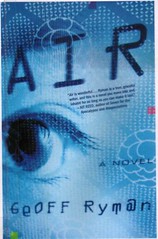Air, by Geoff Ryman
Ryman is one of those "cool" authors engaged in speculative fiction, one of the very first authors to make use of the hypertext abilities of the internet in the writing of his novel, 253. The number refers to the number of passengers in a standard tube train in the London Underground. The novel was first published online, and included hypertext links from one character to others with some sort of connection. So, reading could be by jumping from one character to another, or going sequentially from seat to seat. It has been published as a proper book (with courier font) but I have yet to read it. One day.
I have now read Air, however. This had a brilliant premise, was on the whole really well executed but unfortunately fell flat right at the end - perhaps he didn't quite know how to finish it off, although I have a very simple suggestion: there was just a bit too much hokey mysticism in the last 30 pages.
Kizuldah is a tiny hilltop village in Karzistan, a remote country located between China, Mongolia and Kazakhstan. It was the very last village to go online: the year is 2020 so of course the internet has developed somewhat - it is accessed as an always on, ubiqutious virtual reality. Unfortunately, on the day of it being tested, it came as a bit of a shock to some of the inhabitants. Old Mrs Tung died in the arms of the central character, Chung Mae, and her spirit, character, identity flowed into Chung Mae's body. Thereafter, whenever they shared emotional states, there would be a battle for control between them. Somehow, through this process, mae is enabled to see into the truth of other people, both as to their past and their future.
The novel is ultimately about the impact of this new technology on the old established ways of Kizuldah: our hero, Mae, who was in the fashion game anyway embraced the new ways. She's a marvel, in the way she thinks things through, and plays on the emotions and guilt of the western world, to which she now has access, for the better of her village. Self interest is never her motivation, not that everyone can recognise that. Some of the technology is a bit wack: there is a talking dog, which has a remarkable ability to talk about smells, but isn't very happy with what has been done to him. Weirdest was lunch, the talking soup. I'm not sure I could eat something that said to me "We are designed to provide full vitamin and other protein content undminished by death or cooking. Think of us as the perfect form of happy nutrition."
Of course, life goes on, so there is a lot about life in the small village, of Mae's neighnours, her family. At one point, I thought that Ryman was heading towards banality, when Mae has an affair with her neighbour. It looked like she was going to be put to a choice between the two men, as if that was still the only option available to a modern women, but he sidesteps this problem rather neatly.
There is the inevitable showdown between the old and the new, when the combination of Mrs Tung's memory and the best computerised weather prediction equipment combine to convince Mae there is going to be a flood which will wash away her village. She tries to warn everyone, but do they pay any attention? Hell no: "you have been spending too much time in Air, you need to get out more, we think you might be mad" is the general reaction.
My favourite episodes, however, revolve around this teenage girl Sezen:
Oh, this was a filthy house. Perhaps Hatijah was a bit simple. She offered Mae roasted corn. Not with your child's wet shit on it, thought Mae, but managed to be polite.And yet it is Sezen who turns out to have the best ideas for Mae's fashion business and, once she gets some recognition from Mae, becomes fiercely devoted to her. Mae, in turn, recognises the obligation that devotion places upon her; she has, in effect, become Sezen's mother and lives up to the role honorably.
The daughter, Sezen, stomped in barefoot for her fitting, wearing the dress. It was a shade of lemon yellow that seared the eyes. Sezen was a tough, raunchy brute of a girl and kept rolling her eyes at everything: at her nervous mother, at Mae's efforts to make the yellow dress hang properly, at anything either one of the adults said.
There's a bit of humour: Ryman calls his bank manager Mr Saatchi Saatchi, and has a format war just like today's between Windows and Linux - his is between the UN and "Gates".
The book has won science fiction writing prizes, but to call it science fiction misses out a big chunk of what this book is doing, in its commentary on relations between the developed and third worlds, within the community (which has its own tensions, thanks to being comprised of a number of races and religions), between individual people, and on change. It is really really good!



0 Comments:
Post a Comment
Subscribe to Post Comments [Atom]
<< Home